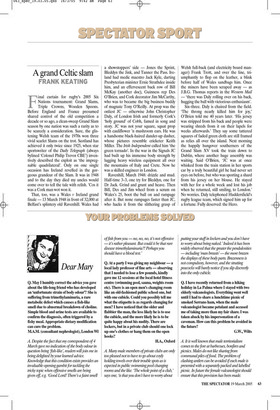F inal curtain for rugby’s 2005 Six Nations tournament: Grand Slams,
Triple Crowns, Wooden Spoons. Before England and France presumed shared control of the old competition a decade or so ago, a clean-sweep Grand Slam season by one nation was such a rarity as to be scarcely a consideration. Sure, the glistening Welsh team of the 1970s won three vivid scarlet Slams on the trot. Scotland has achieved it only twice since 1925, when star sportswriter of the Daily Telegraph (always bylined ‘Colonel Philip Trevor CBE’) inventively described the exploit as ‘the impregnable quadrilateral’. Only on one single occasion has Ireland revelled in the gorgeous grandeur of the Slam. It was in 1948 and to the day they died my uncles would come over to tell the tale with relish. ’Cos it was a Cork man wot won it.
That, too, was a Wales v Ireland grand finale — 13 March 1948 in front of 32,000 at Belfast’s splintery old Ravenhill. Wales had a showstoppers’ side — Jones the Sprint, Bleddyn the Jink, and Tanner the Pass. Ireland had medic maestro Jack Kyle, darting Presbyterian minister Ernie Strathdee inside him, and an effervescent back row of Bill McKay (another doc), Guinness rep Des O’Brien, and Cork decorator Jim McCarthy, who was to became the big business buddy of magnate Tony O’Reilly. At prop was the onliest JC — otherwise John Christopher Daly, of London Irish and formerly Cork’s ‘holy ground’ of Cobh, famed in song and story. JC was not your square, squat prop with cauliflower ’n mushroom ears. He was a handsome black-haired dander-up dasher, whose pictures resemble cricketer Keith Miller. The Irish Independent called him ‘the green tornado’. In the war in the Signals JC had built up his immense body strength by lugging heavy wireless equipment all over the mountains of Italy and Crete. Now he was a skilled engineer in London.
Ravenhill, March 1948: drizzle and mud. Half-time 3–3, one try for Bleddyn, one for Dr Jack. Grind and grunt and heave. Then Bill, Des and Jim wheel from a scrum on Wales’s 25, boot the ball on and rampage after it. But none rampages faster than JC, who hacks it from the slithering grasp of Welsh full-back (and electricity board manager) Frank Trott, and over the line, triumphantly to flop on the leather, a blink before half of Wales sandbags him. Once the miners have been scraped away — as J.B.G. Thomas reports in the Western Mail — ‘there was Daly rolling over on his back, hugging the ball with victorious enthusiasm’.
Six–three. Daly is chaired from the field. ‘The throng nearly killed him for joy,’ O’Brien told me 40 years later. ‘His jersey was stripped from his back and people were wearing shreds from it on their lapels for weeks afterwards.’ They say some tattered squares of faded green cloth are still framed as relics all over the island. Next morning the happily hungover southerners of the Grand Slam XV took the train down to Dublin, where another huge assembly was waiting. Said O’Brien, ‘JC was at once whisked from the train station in her sports car by a truly beautiful girl he had never set eyes on before, but who was sporting a shard from his jersey on her blouse. He stayed with her for a whole week and lost his job when he returned, still smiling, to London.’ No worries. Daly telephoned Huddersfield’s rugby league team, which signed him up for a fortune. Fully deserved: the Hero.
















































 Previous page
Previous page